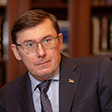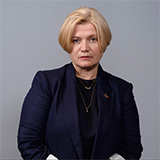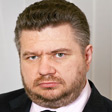Доповідь Шведське агентство оборонних досліджень: "Рапід Дрифт Києва до Москви"
RUFS Briefing No. 4, June 2010
Kyiv's Rapid Drift Back to Moscow
Since the election of Viktor Yanukovych as the new president in February 2010, Ukrainian-Russian relations have
substantially strengthened. Not only has the downward spiral from the Yushchenko years been reversed, which was
quite predictable, but the process has moved forward with remarkable pace and real substance. One may even ask to
what extent Ukraine from now on will be able to pursue a foreign policy independent of Russia.
One example of Ukraine's compliance came on 21 April 2010, when Yanukovych made the controversial deal to
extend the Russian Black Sea Fleet's basing in Sevastopol until 2042. The Ukrainian motive for signing the
agreement was purely economic: to limit the country's huge budget deficit. In exchange for Ukraine's extending the
fleet's lease, Russia gave Ukraine a ten-year 30 per cent discount on its gas imports.
The deal will have far-reaching security consequences for Ukraine. One major concern is the fear that Russia will use the fleet base to foment
Russian separatism in Crimea, the only Ukrainian region with an ethnic-Russian majority. Shortly after the signing
of the fleet agreement, another bilateral agreement provided for the return of Russian FSB military counterintelligence
officers to the Black Sea Fleet. As late as December 2009, Ukraine had ordered FSB officers attached to
the fleet to leave Ukraine's territory, as their presence contravened CIS-wide agreements that prohibit FSB
operations on the territories of CIS member countries.
During President Dmitry Medvedev's visit to Ukraine, on 17-18 May in Kyiv, a range of new bilateral treaties were
signed, including agreements on the demarcation of the Russian-Ukrainian land border and joint declarations
concerning the need for a new European security architecture, and one on the conflict in Transnistria. This
indicates that the Ukrainian government is willing to increase cooperation with Russia in the security sphere and to
harmonize its foreign policy with Russia's. The two presidents also signed agreements on Ukraine's using the
Russian navigational system GLONASS and on cooperation between the ministries of culture and education. It also
seems likely that new treaties will be signed soon on cooperation in the fields of the aviation industry and on
nuclear energy.
The new agreements, as well as the proposals – among them one by Vladimir Putin to merge Gazprom and
Naftohaz – underscore that we are now witnessing a new phase in the reintegration of the two former Soviet
republics. The substance and speed of this process raise the question whether Ukraine is heading to a point of no
return, a point from which this process of resignation to Moscow will be impossible to reverse. Officially, Ukraine
still maintains a pro-European foreign policy with the goal of joining the EU. The first trip Yanukovych made as
new president was to Brussels, to underscore this. But there are three reasons why it will be extremely difficult for
Ukraine to pursue a pro-European foreign policy independent of Russia in the future.
First, Ukraine has in effect given away some of its most important foreign policy levers. Already as prime minister in
2006, Yanukovych declared that Ukraine was not ready for NATO membership, at least for the time being. As
president, he is proposing a 'non-bloc' status for Ukraine and has disbanded the two state commissions that used to
handle Ukraine-NATO cooperation programmes. This has limited Kyiv's security policy options, as it has given
away its 'NATO card'. The multi-vector policy of President Leonid Kuchma has been replaced by a single-vector
policy under Yanukovych. Interestingly, given his statements in Kyiv, Medvedev did not see this 'non-bloc' status of
FOI
Totalförsvarets forskningsinstitut
164 90 Stockholm
Tel: 08-555 030 00
Fax: 08-555 031 00
www.foi.se
Ukraine as anything other than a temporary stage towards its future accession to the Russian bloc (primarily to the
Collective Security Treaty Organization (CSTO)).
Second, the rapprochement of Russia and Ukraine coincides with a period marked by the absence of a coherent
Western policy towards Ukraine. Medvedev explained this himself for the Ukrainian media before his Kyiv visit: 'As
soon as any vacuum emerges, the temptation arises to fill this vacuum with something... This is why Europe and
NATO showed an absolutely calm reaction to our agreement with Ukraine to extend the presence of Russia's naval
base in Sevastopol.' Thus, in Moscow's interpretation, the EU has allowed Russia a walkover on the issue of
Ukraine.
The speed with which the Russian Ministry of Foreign Affairs and Presidential Administration have prepared new
proposals for reintegrating Ukraine with Russia cannot but impress. Even if only half of them are implemented, it
will probably be enough to pull Ukraine securely within Russia's sphere of influence for a long time to come. The
contrast to the EU's slow bureaucracy and lack of vision concerning Ukraine could not be more striking. The
Eastern Partnership, which less than a year ago was considered a landmark in relations between the EU and the
former Soviet republics, seems to be on the back burner in Brussels. Europe is embroiled in its own internal
problems and not interested in other matters, such as Ukraine. Russia, on the other hand, has both a vision and
financial power to achieve what it wants with its southern neighbour. Moscow is eager to move quickly in its
process of reintegrating Ukraine, beyond the point of no return, while the opportunity lasts.
The current Russian campaign to tie up Ukraine could also be linked to the likely major switch in Russian foreign
policy which has been discussed since a policy paper was leaked to Russian Newsweek in May 2010. According to
this policy paper, the Kremlin seems to be aiming for an enduring understanding with the West and settling
outstanding differences on the solid basis of carving up Eurasia into clear zones of dominance and a written code of
conduct. Russia seems to be saying to the West: 'If you do not interfere in our zone of interests, we will not make
trouble for you.'
The third reason why Ukraine's current policy of resignation to Russia will be difficult to reverse is that it is,
according to different surveys, rather popular among a large section of the Ukrainian population. Many Ukrainians
were tired of what they perceived as Yushchenko's antagonistic policy towards Russia, which only destroyed Kyiv's
important links to a strategic neighbour without leading to a major breakthrough in the country's integration with
the West. That is why the protests against the government's new policy have been rather weak. The political
opposition, apart from staging a spectacular show in the Parliament on the day the fleet agreement was ratified, is
split and still paralysed by its loss of the election.
As Ukraine seems to have limited levers for reversing the current reintegration process, full membership of Ukraine
in the CIS and the CSTO or the proposed customs union with Russia and Kazakhstan could be within reach for
Russia. That would effectively mean the death blow for Ukraine's European integration, which now faces its
moment of truth.
Jakob Hedenskog
Swedish Defence Research Agency
Stockholm
www.foi.se/







